One of my favorite shows on Amazon prime is The Marvelous Mrs. Maisel. Like many viewers, I fell in love with Rachel Brosnahan’s character, Midge, and her ability to break stigmas as a Jewish-American woman living in New York’s Upper East Side in the 1950s.
In contrast to societal expectations, Midge forges her own path as a female comedian while working part time, co-parenting and performing stand-up comedy, all considered taboo at the time.
Today there are numerous minority women who also are creating their own path in America, despite cultural and religious expectations placed on them. Women such as Muslim-American writer and actress Aizzah Fatima, who uses her identity to try to change people’s perceptions about Muslim-American women.
Similar to Midge Maisel, Fatima uses her personal experiences to write comical plays that depict everyday challenges and cultural taboos that Muslim-American women face in the United States.
Her most popular work, Dirty Paki Lingerie, which she wrote and stars in, addresses the lives of six Pakistani-American women in post-9/11 America.
To learn more about Fatima and how she aims to break down cultural stereotypes of Muslim-American women, I recently conducted a phone interview with the budding actress. Below are her thoughts on why it is important to give women like her a voice. Please enjoy and share!
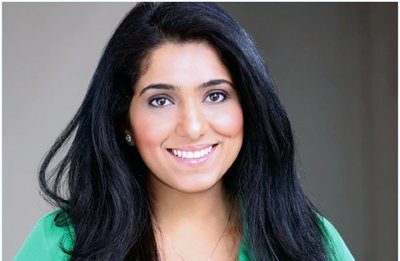
What attracted you to performing arts?
While working as an ads engineer for Google, I started thinking about times when I was happy. I was in ninth or tenth grade, and got involved in school plays. That came naturally to me, and I thought I should just take an acting class for fun. I signed up for an introduction to acting and improv class at NYU. One thing led to another, and I eventually ended up doing a two-year conservatory course at The American Academy of Dramatic Arts.
I finished the degree and started doing theater auditions, but I wasn’t really interested in any roles, or the right material just wasn’t there. I then ended up taking a writing class in 2009 with Matt Hoverman, and it was August of that year that I began to write Dirty Paki Lingere.
What is the play about?
Dirty Paki Lingerie is about the American-Muslim Pakistani female identity. Each character that I portray struggles with a different issue, such as sexuality, identity, racial profiling, bullying, marriage and religion.
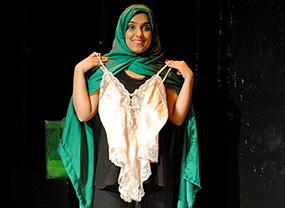
How did you come up with the concept?
The play is mostly based on interviews I conducted with the Muslim community in the New York and New Jersey area.
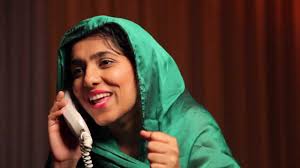
How does the play address Muslim-American stereotypes?
The play tackles issues considered taboo within the Muslim-American community, such as sex, sexuality, and divorce. The play also tackles stereotypes associated with Muslim women who are abused and battered, by showing a lighter, funnier side to the women. Eventually, the audience realizes that the issues each character deals with are issues all women deal with, no matter their race or religion.
What was the Muslim-American community’s reaction to the play?
So, I have gotten death threats, people trolling me on Twitter, and unpleasant Facebook messages from people in my own community and from people outside of it. I think it has taken them a long time to come on board because I talk about sexuality as it pertains to the female body.
You know, I really don’t think the Muslim community knew how to take it. Sometimes I think comedy is lost on them, and it’s like you get dinged from both directions. The far right hates you because you are you are flaunting your identity, and the Muslim community hates you because you are talking about lingerie.
That said, I do think a lot of Muslim organizations are now on board. I am currently working with a female director and have used the characters from Dirty Paki Lingerie to create a feature film. We have been working on this for the past six years and are currently in post-production. The film is scheduled to come out next year, and all of our investors are Muslim.
What are some stereotypes you have encountered as a Muslim-American actress?
It’s like the Muslim female identity is still not understood or talked about. When it is, it’s always so sexually oppressed. As an actor, when I am being filmed for different roles, the director wants me to wear a hijab and speak with an accent. We are always seeing a Muslim female from an outside lens, like that of a white male or female.
The people writing these characters right now are white and are always going to be the outsiders looking in. Their perception from the outside is so different to someone who is living as a Muslim-American female, day in and day out.
I often hear filmmakers say, ‘oh we want to cast a Middle-Eastern actor,’ then you read the script and it says the character comes from a generic Middle Eastern place. And I’m like, what is this “generic” middle Eastern place? And they say, ‘we’re just looking to cast an actor, then we’ll tailor the piece to them.’ And then I tell the writer, who is white, ‘why don’t you hire someone who is ethnically or religiously from that background to write the story.’
How would that break stereotypes in the film industry?
You know, people talk about diversity and inclusion, and to me, that is not about getting a brown, black or yellow body in the room. It’s more about giving that brown, black or yellow person the chance to be a decision maker.
But our communities are just not there yet. We have not been around long enough to have community structures to allow people to become heads of organizations. We shouldn’t just create a token role for a Muslim-American woman. Put the person in the room, then give them the tools they need to become the decision maker.
What are some other ways you are breaking stigmas about Muslim-American women?
I am currently working on a project titled Muslim Girls DTF: Discuss Their Faith.” I got together with a bunch of female comics and comedy writers, and we composed some questions such as, ‘hey, what do you think about eating pork, you Muslim women?’
We interviewed eight people, and their answers are so diverse. We also asked things like, ‘can you tell us about your worst dating experience,’ or ‘can you tell us the worst pick-up line a guy has used on you?’
I just feel Muslim women need to have a greater say about how they are depicted. Unless we do it ourselves, people are always going to do it from the outside.
The stereotypes around Muslim women won’t change until more of them step up to the plate and there are a thousand of them writing their own stories.

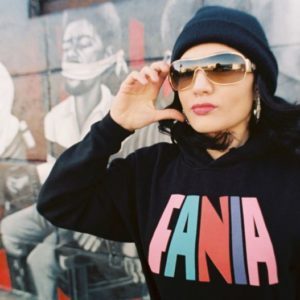
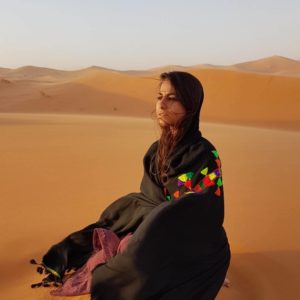
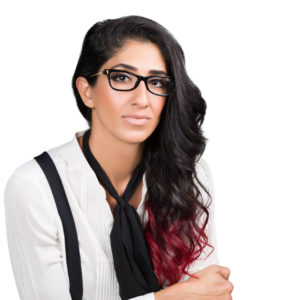
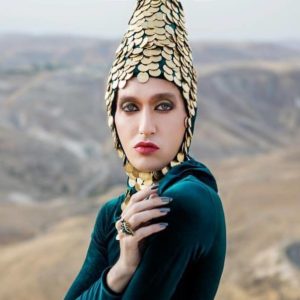
Leave a Reply